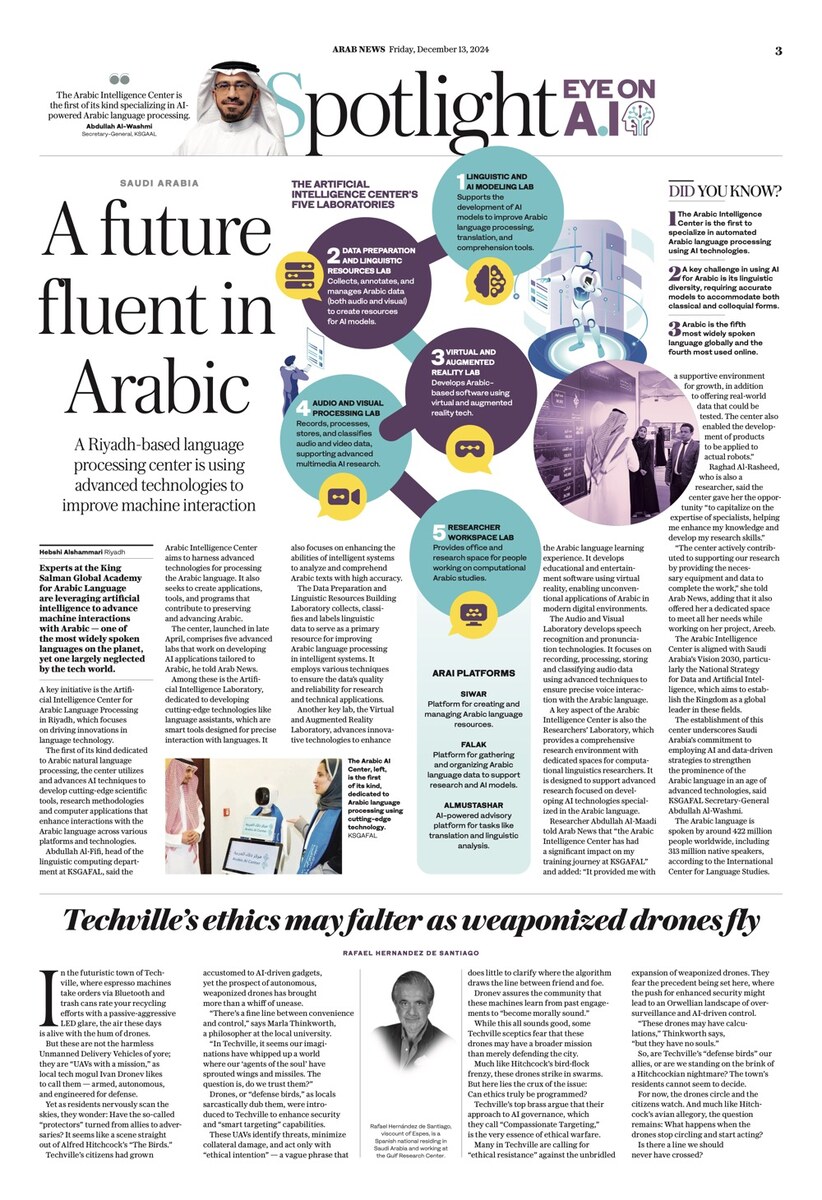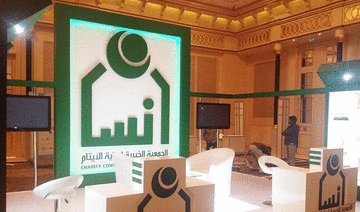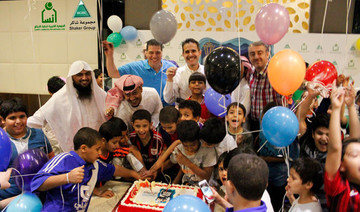RIYADH: Experts at the King Salman Global Academy for Arabic Language are leveraging artificial intelligence to advance machine interactions with Arabic — one of the most widely spoken languages on the planet, yet one largely neglected by the tech world.
A key initiative is the Artificial Intelligence Center for Arabic Language Processing in Riyadh, which focuses on driving innovations in language technology.
The first of its kind dedicated to Arabic natural language processing, the center utilizes and advances AI techniques to develop cutting-edge scientific tools, research methodologies and computer applications that enhance interactions with the Arabic language across various platforms and technologies.
Natural language processing, or NLP, is a subfield of AI that bridges the gap between human communication, spoken or written, and machine understanding. It enables computers to understand human languages and generate text and speech in a natural way by combining computational linguistics with statistical modeling, machine learning, and deep learning.

Abdullah Al-Fifi, head of the linguistic computing department at KSGAFAL, said the Arabic Intelligence Center aims to empower researchers and developers to harness advanced technologies for processing the Arabic language. It also seeks to create applications, tools, and programs that contribute to preserving and advancing the Arabic language.
The center, launched in late April, comprises five advanced labs that work on developing AI applications tailored to Arabic, he told Arab News.
Among these is the Artificial Intelligence Laboratory, dedicated to developing cutting-edge technologies like language assistants, which are smart tools designed for precise interaction with languages. It also focuses on enhancing the abilities of intelligent systems to analyze and comprehend Arabic texts with high accuracy.
The Data Preparation and Linguistic Resources Building Laboratory collects, classifies and labels linguistic data to serve as a primary resource for improving Arabic language processing in intelligent systems. It employs various techniques to ensure the data’s quality and reliability for research and technical applications.
Another key lab, the Virtual and Augmented Reality Laboratory, advances innovative technologies to enhance the Arabic language learning experience. It develops educational and entertainment software using virtual reality, enabling unconventional applications of Arabic in modern digital environments.
The Audio and Visual Laboratory develops speech recognition and pronunciation technologies. It focuses on recording, processing, storing and classifying audio data using advanced techniques to ensure precise voice interaction with the Arabic language.
A key aspect of the Arabic Intelligence Center is also the Researchers’ Laboratory, which provides a comprehensive research environment with dedicated spaces for computational linguistics researchers. It is designed to support advanced research focused on developing AI technologies specialized in the Arabic language.

Researcher Abdullah Al-Maadi told Arab News that “the Arabic Intelligence Center has had a significant impact on my training journey at KSGAFAL” and added: “It provided me with a supportive environment for growth, in addition to offering real-world data that could be tested. The center also enabled the development of products to be applied to actual robots.”
Raghad Al-Rasheed, who is also a researcher, said the center gave her the opportunity “to capitalize on the expertise of specialists, helping me enhance my knowledge and develop my research skills.”
“The center actively contributed to supporting our research by providing the necessary equipment and data to complete the work,” she told Arab News, adding that it also offered her a dedicated space to meet all her needs while working on her project, Areeb.
DID YOU KNOW?
• The Arabic Intelligence Center is the first to specialize in automated Arabic language processing using AI technologies.
• A key challenge in using AI for Arabic is its linguistic diversity, requiring accurate models to accommodate both classical and colloquial forms.
• Arabic is the fifth most widely spoken language globally and the fourth most used online.
The Arabic Intelligence Center is aligned with Saudi Arabia’s Vision 2030, particularly the National Strategy for Data and Artificial Intelligence, which aims to establish the Kingdom as a global leader in these fields.
It seeks to pioneer the use of AI for the Arabic language and provide integrated services that empower users to enhance its global prominence.
The establishment of this center underscores Saudi Arabia’s commitment to employing AI and data-driven strategies to strengthen the prominence of the Arabic language in an age of advanced technologies, said KSGAFAL Secretary-General Abdullah Al-Washmi.

He added the center has strengthened Arabic’s global position by using modern technologies that help the language adapt to ongoing developments through its advanced labs.
The Arabic language is spoken by around 422 million people worldwide, including 313 million native speakers, according to the International Center for Language Studies. It is the fifth most widely spoken language globally and the fourth most used online, according to Internet World Stats.






























